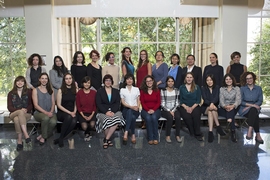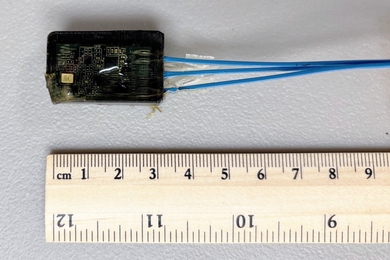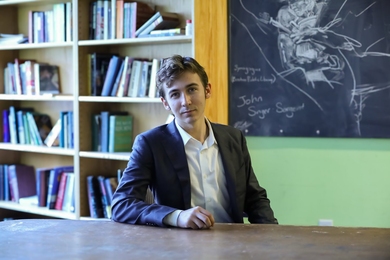“Wait a minute… I’m the only female in this class!” realizes the engineering student in the cartoon, sandwiched beside her two male classmates. She shakes nervously, hands clenched, considering the responsibility of “representing all of womankind” before collapsing face-down on her desk. “Ditz” and “Psycho” thought bubbles appear above her smirking classmates’ heads.
So began the kickoff event in the You Belong @ MIT interactive seminar by Catherine Good, an associate professor of psychology at Baruch College of the City University of New York, senior research scientist at Turnaround for Children, and expert in the field of academic belonging. Participants in Good’s April 4th seminar debated the meaning and implications of this cartoon by Jorge Cham of The Stanford Daily. Organized by the MIT Teaching and Learning Lab, with support from the MindHandHeart Innovation Fund, the event was part of a three-phase initiative to increase students’ sense of academic belonging.
Academic belonging, Good explained, is distinct from friendship or acceptance from peers. “It’s not about whether I have a friend in my class or someone to go to the movies with. It’s about feeling like a valued member of my academic department or discipline.” She continued, “The absence of academic belonging impacts many students, but it affects underrepresented minorities and women in STEM fields most acutely. This can lead to decreased engagement in the classroom, and in some cases, poor academic performance.”
In the first part of the seminar, Good presented the latest research on academic belonging to faculty, postdocs, and administrators from across the Institute. During a follow-up workshop, participants discussed concrete strategies for increasing students’ sense of belonging and overall resiliency.
Fixed vs. growth mindset
Good began by introducing two commonly held theories of intelligence related to academic belonging: the fixed and growth mindsets. Those in the fixed camp view intelligence as determined by nature, while those in the growth camp believe it is malleable and rooted in effort. “Individuals with a fixed mindset view achievement as a way to validate their identity. Those with a growth mindset view achievement as a way to acquire new skills and knowledge. They may be working to solve the same problems, but they’re pursuing different goals.”
Good spoke to the specific challenges that a fixed mindset poses for high-achieving students. “Many of them haven’t developed the skills or resources to overcome academic challenges,” she said. “They’re left with their own interpretation of ‘What does it mean to study really hard for a test and only get a B-minus?’ Effort, hard work, failure, struggle — all of those things take on a different meaning in a fixed vs. a growth mindset. A fixed view of intelligence is great as long as you never have to struggle.”
The group discussed how many students enter MIT with a fixed view of intelligence, and the challenges it can pose. A participant reflected, “One of the things we have to consider at MIT is that we’re skimming the upper echelon of students. Many of them were at the top of their high school class. Now that they’re in a pool of all high-achieving people, it can feel like they’re not smart anymore.”
Another participant added, “Many of our students have built their whole self-concept around the idea of being ‘smart.’ If they feel like they’re not ‘smart’ anymore, it’s almost as if they don’t exist. If they’re not the best, then they feel like they’re nothing.”
Strategies for growth and belonging
Participants discussed ways to encourage students to adopt a growth mindset, and normalize effort and engagement as the path to success. Good suggested starting with the neurological underpinnings of intelligence. “In my research, I’m explaining to elementary, middle, and high school students that the brain is filled with cells called neurons, and to get smarter means the neurons communicate between each other more effectively through repeating an activity. The mind is like a muscle: The more you work it, the stronger it gets.”
Good reviewed research studies and highlighted some of the documented effects of fostering a growth mindset. “It’s striking that when you teach people about growth mindset, that gaps in achievement between black and white kids, men and women, go away even on standardized tests.” Growth mindset, she said, has also been shown to counter stereotype threat, a condition where one feels at risk of confirming to stereotypes about their social group.
Participants shared ways they or their colleagues have worked to encourage a growth mindset at MIT, as well as new ideas for doing so. The group discussed discouraging overt competitiveness, which can undermine belonging; grading students based on established benchmarks of mastery; allowing students to correct their homework and receive partial credit for doing so; working with struggling students to cultivate better studying strategies; recognizing what students are doing well in addition to what they can improve upon; and acknowledging that a student’s performance in one class is not enough information to predict their overall success in a field of study.
The group discussed how hearing stories of failure and resilience from professors and respected peers is profoundly meaningful to students who are struggling academically and may feel isolated. “Everyone shows you Superman, but no one shows you Clark Kent,” summarized one participant.
The interactive seminar and workshop on academic belonging were preceded by a book club on the same topic. The Teaching and Learning Lab is currently planning the second of the three-part You Belong @ MIT program.
You Belong @ MIT was funded by the MindHandHeart Innovation Fund, which awards grants to projects advancing wellness, mental health, and community at MIT.










